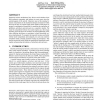Free Online Productivity Tools
i2Speak
i2Symbol
i2OCR
iTex2Img
iWeb2Print
iWeb2Shot
i2Type
iPdf2Split
iPdf2Merge
i2Bopomofo
i2Arabic
i2Style
i2Image
i2PDF
iLatex2Rtf
Sci2ools
130
click to vote
CORR
2010
Springer
2010
Springer
Mathematical Modeling of Competition in Sponsored Search Market
Sponsored search mechanisms have drawn much attention from both academic community and industry in recent years since the seminal papers of [3] and [4]. However, most of the existing literature concentrates on the mechanism design and analysis within the scope of only one search engine in the market. In this paper we propose a mathematical framework for modeling the interaction of publishers, advertisers and end users in a competitive market. We study the competition between two search engines as a three-stage dynamic game and prove the existence of Nash equilibrium prices when allowing advertisers to participate in both advertising systems simultaneously. To compare the expected revenues and social welfare under competition and monopoly, we carry out extensive simulation under common parameter setting of participants. Our results can provide useful insight in regulating the sponsored search market and protecting the interests of advertisers and end users.
Related Content
| Added | 25 Dec 2010 |
| Updated | 25 Dec 2010 |
| Type | Journal |
| Year | 2010 |
| Where | CORR |
| Authors | Jian Liu, Dah Ming Chiu |
Comments (0)

